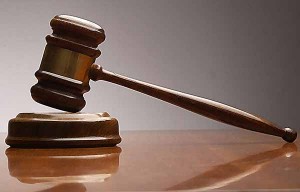 It is not often that a constitutional democratic state faces a full blown strike by one of the three arms of government but that is exactly what happened in Malawi this year – with non-judicial staff downing tools for 2-1/2 months and all judicial officials joining them for the last two weeks. This column looks at the unfortunate ramifications of this extraordinary strike, which resulted in the country’s entire judicial system shutting down.
It is not often that a constitutional democratic state faces a full blown strike by one of the three arms of government but that is exactly what happened in Malawi this year – with non-judicial staff downing tools for 2-1/2 months and all judicial officials joining them for the last two weeks. This column looks at the unfortunate ramifications of this extraordinary strike, which resulted in the country’s entire judicial system shutting down.
The genesis of the strike goes back to the 1995 Malawi Constitution (section 114), as read with the Judicature Administration Act, which mandates Parliament to determine and review the terms and conditions of service of the Judiciary every three years. In 2006, Parliament duly made the review. However, the Executive did not implement them, probably on the basis that the increased salaries were on the higher side.
The Malawi Law Society took the matter to court. On 9 February 2007, the High Court, sitting as the Constitutional Court, ruled that since Parliament had reviewed the conditions of services for the Judiciary, the government must implement them. (The State v President of the Republic of Malawi & 2 Others ex parte Malawi Law Society Constitutional Cause Number 6 of 2006). Despite this, the government of President Bingu wa Mutharika did not implement them.
After years of grumbling and discussions but no salary increase, the situation came to a head this year events culminated in this year’s remarkable strike, which saw non-judicial staff members, including court clerks, stop work in early January and all judicial officers, including judges, magistrates and registrars, following suit on 29 February
There were protracted negotiations between the government and the Judiciary, with the Executive giving an economic argument that it was not feasible to implement the salary increments and pay the arrears. The Judiciary gave a constitutional argument that resuming duties without the implementation would make it become party to the ‘illegal enterprise’ contradicting its duty to defend and enforce the Constitution. A deadlock ensued.
Needless to say, the strike severely affected those involved. Lawyers, whose work is mainly court-based, have been struggling to earn their bread and butter. The Malawi Law Society even contemplated taking the matter to the African Court.
But above all, for months there was no access to justice, which is a constitutional right. Consequently, human rights and the Constitution have been being violated. For example, the Constitution provides that suspects can be detained for only 48 hours within which time they must be brought before a court. Otherwise, they must be released. This could not happen, which suggests that there must have been numerous cases of illegal detention and/or detention without trial. It is likely that a lot of taxpayers’ money will be wasted in civil suits against government on this account.
In addition, police cells and prisons were reportedly congested causing outbreaks of disease, including TB. Despite this, the Police continued to arrest suspects who were not being granted bail in majority of cases. For example, Chichiri Prison in Blantyre, which is meant to accommodate 800 inmates, was reportedly keeping about 3000, some of whom were merely suspects awaiting trial. Uncorroborated reports allege that detained people had resorted to sleeping on top of each other.
Meanwhile, no one knew when the strike might end. The Mutharika government has shown that it is prepared to wait for a long time before agreeing to resolve critical issues. For example, the main constituent college of the University of Malawi remained closed for over eight months in 2011 as lecturers fought for academic freedom.
But on March 26th, Malawians could finally afford a sigh of relief as they saw the courts reopening after the two sides signed a ‘Settlement Agreement’. While the final details are still not clear, judicial staff appear to welcome the outcome.
But even though it is now over, the strike has brought more questions than answers. Does Malawi appreciate the rationale for having a constitutional democracy with a government made up of three separate but equal branches, namely, the executive, the legislature and the judiciary? Is it not to achieve separation of powers, which ensures a system of checks and balances?
Indeed, the 1995 Constitution of Malawi entrenches this principle whereby the executive initiate laws (and policies), the legislature makes the laws and the Judiciary interprets them and also enforces the Constitution.
Respect for the tenets of constitutional democracy would have averted the judicial strike. Indeed, the Executive should have, at the very least, complied with the High Court decision of February 2007 thereby upholding the rule of law, which is one of the central tenets of constitutional democracy.
Hopefully, lessons have been learnt to the effect that constitutional democracy should not be taken for granted. Indeed, July 2012 is fast approaching when the terms and conditions of service must be reviewed once again. It will be fascinating to see what happens this time around.
Nonetheless, we must not forget as we celebrate the reopening of the courts that Malawi spent months without a fully-functioning arm of government – a constitutional crisis that will have ramifications for a long time to come. Just to take one example – how will victims of the strike, who have suffered human rights violations, obtain redress?





No comments! Be the first commenter?